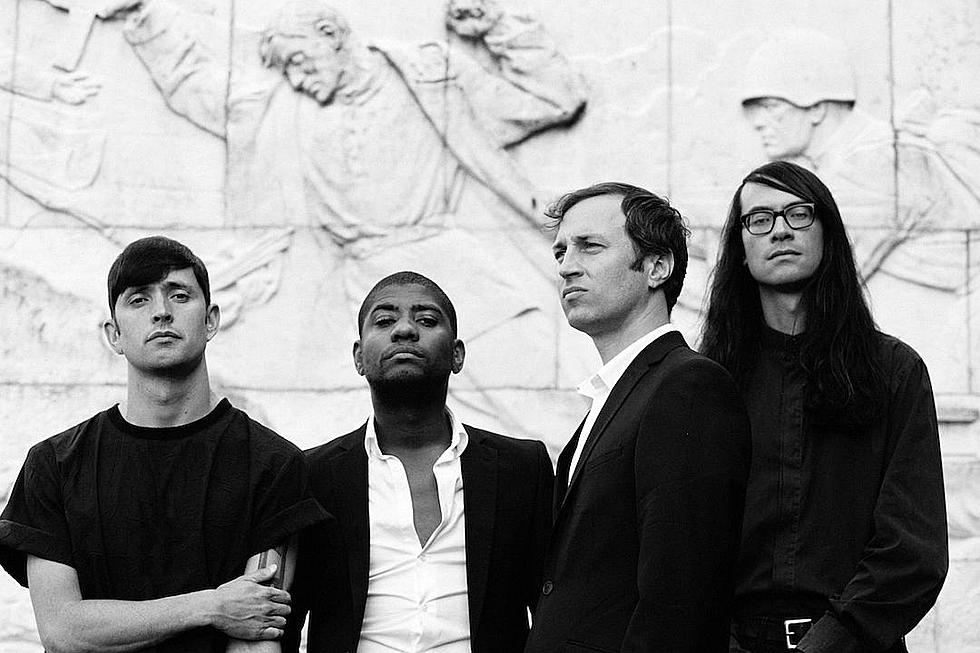
Aussie Psych Psychos King Gizzard and the Lizard Wizard’s Darkest Timeline
King Gizzard and the Lizard Wizard’s new record deals in the destruction of a universe. As the Melbourne-based seven-piece’s forthcoming album, Murder of the Universe, goes about its brutal, rampaging business, a world is falling deeper into despair, and ultimately into oblivion; whether it’s understood as ours or not is up to the listener. (Though frontman Stu Mackenzie will note that he wasn’t intentionally reflecting our own world: “It’s also supposed to be its own world, its own story.”) The theme of extinction is timely — it seems disaster is a feature of daily discourse now. “Maybe that’s not so bad,” Mackenzie muses.
There was a time when the phrase "murder of the universe" could still live comfortably and unequivocally in the realm of hyperbole and fantasy, far outside the bounds of reasonable, rational thought. While in a strictly literal sense, it’s still a string of words that doesn’t hold water, the nauseating acceleration of imbalance and general peril across the globe seems to warrant reexamining that phrase with a more considered look. The fact that such a seemingly preposterous idea has become so suddenly within grasp lifts the curtain on a radical truth — the idea has always been realistic and, therefore, was never that preposterous in the first place. That violent realization calls for confrontation: How is it that these things were within the realm of possibility and, in fact, not far from actuality? It forces us to reconcile with the raw fact that, contrary to what we’d like to believe, things were this bad in the first place.
Murder of the Universe, due June 23 on ATO, is the band’s second full-length this year. Mackenzie posits that the record feels like “a culmination of a lot of things that we’ve been working on over a lot of years.” With 21 tracks clocking in at just over 46 minutes, it’s not a hurried affair. Nor does it overstay its welcome or exhaust its vitality; rather, it’s perhaps their most concentrated and succinct production. (A remarkable feat, considering that last year’s Nonagon Infinity plays as one unending loop.) And a production this is; it’s a concept record with an operatic narrative arc, spanning three chapters, each somehow more apocalyptic than the next. In the first, a human is stalked and overcome by an “Altered Beast,” becoming the beast themselves before perishing. The next chapter is titled “The Lord of Lightning vs. Balrog.” True to its name, it details a struggle between the two mythical titans. The final chapter closes the curtain on this world that King Gizzard have created so devotedly; “Han-Tyumi and the Murder of the Universe” is the third act, the resolution to the insane saga laid out across the record. Han-Tyumi, an anagram for "humanity," is the central cyborg, a befuddled, death-obsessed mensch maschine who winds up destroying the universe because he vomits too much.
If this sprawling, riff-driven, prog-rock epic came from anyone besides Mackenzie and King Gizz, it might play as simply too much: too heavy-handed, too suggestive, too apparent. Mackenzie chuckles, recalling even the band being jolted by the songs: “We kept laughing at it. ‘What the fuck?! This is such a weird record!’” he laughs. But placed atop King Gizzard’s rapid-fire output, which comprises a hypnotic plurality of genre, theme and sound, the record is earnest and believable. Murder of the Universe marks the band’s 10th full-length in just under five years, preceded in 2017 by an adventurous foray into microtones, Flying Microtonal Banana. On record, Mackenzie and his bandmates operate without many borders at all. In the real world, there are four walls containing all this mayhem, in a sagging, fluorescent-lit warehouse in Melbourne’s Brunswick East suburb.
“We decided to rent this space, this big, old concrete slab with nothing in it at all,” Mackenzie explains. Along with other friends and artists, the band writes, records and generally conducts business from this space; drummer Eric Moore operates his label Flightless Records out of it. The band built a small studio within the building, where Murder of the Universe was recorded. Mackenzie notes that it didn’t happen on a timeline, instead the result of “chipping away at it over a long period of time.” He speaks fondly of the situation, even suggesting that being surrounded by other artists has at least partially inspired him to write so much. He’s equally quick to temper that fondness. “It’s just this one box with a really low ceiling,” he says. “It doesn’t sound overly pretty in there. It’s not this utopian music world.”
The balanced assessment reflects a broader disdain for humankind’s tendency to romanticize — the Brunswick East building is surely a spot where creativity can thrive, but it’s dingy and plain, not some Instagram-ready artist den. “Humans are pretty good at looking at the world through rose-colored glasses,” Mackenzie says. “We’re living in bleak times, but we’re shrouded by this cloak of sparkly, modern, positive, comfortable Western life.” While Murder isn’t aimed solely at this behavior, it is a varied record, and its surreal nature is one of the more relatable aspects of it.
“I think this record’s just a very vague or abstract way of opening up some conversations about how ridiculous the world is,” Mackenzie explains. “We’re all living an illusionist life. It’s definitely easier to live like that. Without sounding too pretentious, I think the record is supposed to be so opposite of that, that it horseshoes around and becomes pretty escapist in that it’s so extreme — and so real — that it becomes pretty unreal.”
The frenzied, cyclical, warped riffs of the first chapter, paired with Mackenzie’s vivid words and an omniscient narrator’s guidance, evoke a nearly visual reaction. “Your skin is crawling with dry, crusted mud, and your naked feet are wet in a pool of blood, and the whistle of the wind in your ears is so loud that your memories have blown up in a mushroom cloud,” goes the almost taunting coo of the narrator on the opening track (voiced calmly and hauntingly by Australian folk singer Leah Senior). The staggering rate at which King Gizzard can create hyper-engaging musical worlds is matched only by the clarity and intricacy of them.
“It’s probably subconscious from watching so many fucking films,” Mackenzie laughs. “Humans are almost always going to attach a visual element to everything. There’s so much of a cultural aspect to making music and the way you visualize sound.” Like every other fragment of modern existence, music is not free of the strings-attached nature of contextualizing. Mackenzie thinks this is worthy of interrogation: What are the broader implications to just hearing a sound? When we listen, what else happens in our brain? What images and associations are these sounds triggering? The nonverbal elements of Murder paint just as strong a picture as the overt lyrical descriptions, and they’re fucked with accordingly. The squealing, train-howl harmonica on “Altered Beast II,” executed fantastically by Ambrose Kenny-Smith, is too affected and frightening to recall the instrument’s tame uses in country or blues music, instead perverting our associations of that sound into some hellish Mad Max outback dystopia. “You hear flutes, and it makes you think of some English countryside or medieval Europe. Why does that do that?” Mackenzie presses. “I think it’s innate. Everything looks like a certain thing to me with this record.”
The record’s final chapter — which, if you’ll recall, tells the tale of a half-human named Han-Tyumi — finally brings about the absolute destruction of the universe, when the titular cyborg’s own vomit envelops and kills the whole world, thus completing the "murder of the universe." A metaphor for dependence on technology? A hot take on our addiction to cell phones? Mackenzie recoils. “It was less trying to make a statement, more just trying to tell a story that sounded so absurd, and so ridiculous, but was actually within the realm of possibility,” he explains. “It’s supposed to scare the shit out of people, right?”
Here he exposes the root of this record: fear and anxiety. Mackenzie observes a difficulty in confronting both, especially as they pertain to the meaning — or non-meaning — of our lives. “People are really anxious about the future, and potentially afraid to talk about what’s really going to happen, or afraid to even come to terms in their own mind about what’s really going to happen in the next couple hundred years,” he says, admitting that he wants the band’s new record to expose these fears. “I think trying to strike a nerve or trying to freak people out is part of what Murder of the Universe is supposed to be about: trying to say a couple things that people would usually be too afraid to talk about.”
It’s clear that Mackenzie is speaking from a place of concern and care; everyone has their own mechanisms to combat and dull the needling anxiety of existential dread. His breakneck work pace and utter dedication to exploring and indulging every lightly trodden recess of his creative spectrum seem to suggest that creating records with King Gizzard is his. “I’m not very good at sitting down and relaxing,” he admits. “It’s always been trying to stay on the treadmill for me. I’m scared about getting off the treadmill. I tend to get sad when I stop writing.” His voice is more serious here, more considered. “I try and just keep on running. Sometimes I don’t really know which direction I’m going, but I think if you’re always doing something, it’s better than not doing anything.”
Perhaps Murder of the Universe isn’t prophetic or prescient at all (good money has us not dying by stomach bile), but rather a document of right here and right now. As sea levels rise, temperatures fluctuate and oil spills across the land, Mackenzie feels more like an observer with a keen, honest eye than a fortune teller. He notes that King Gizzard’s exhaustive touring has lent perspective and grounding, much of which informed their new album. “Some of the ideas in this record, we’re trying to say things that sounded so ridiculous, but could maybe be real or not that far from reality,” he says. “It’s not the way we’re heading; it’s the place we’ve already come to. We’re not heading toward this thing — we’ve kind of already arrived.”
Follow Luke Ottenhof on Twitter.
More From CLRVYNT









